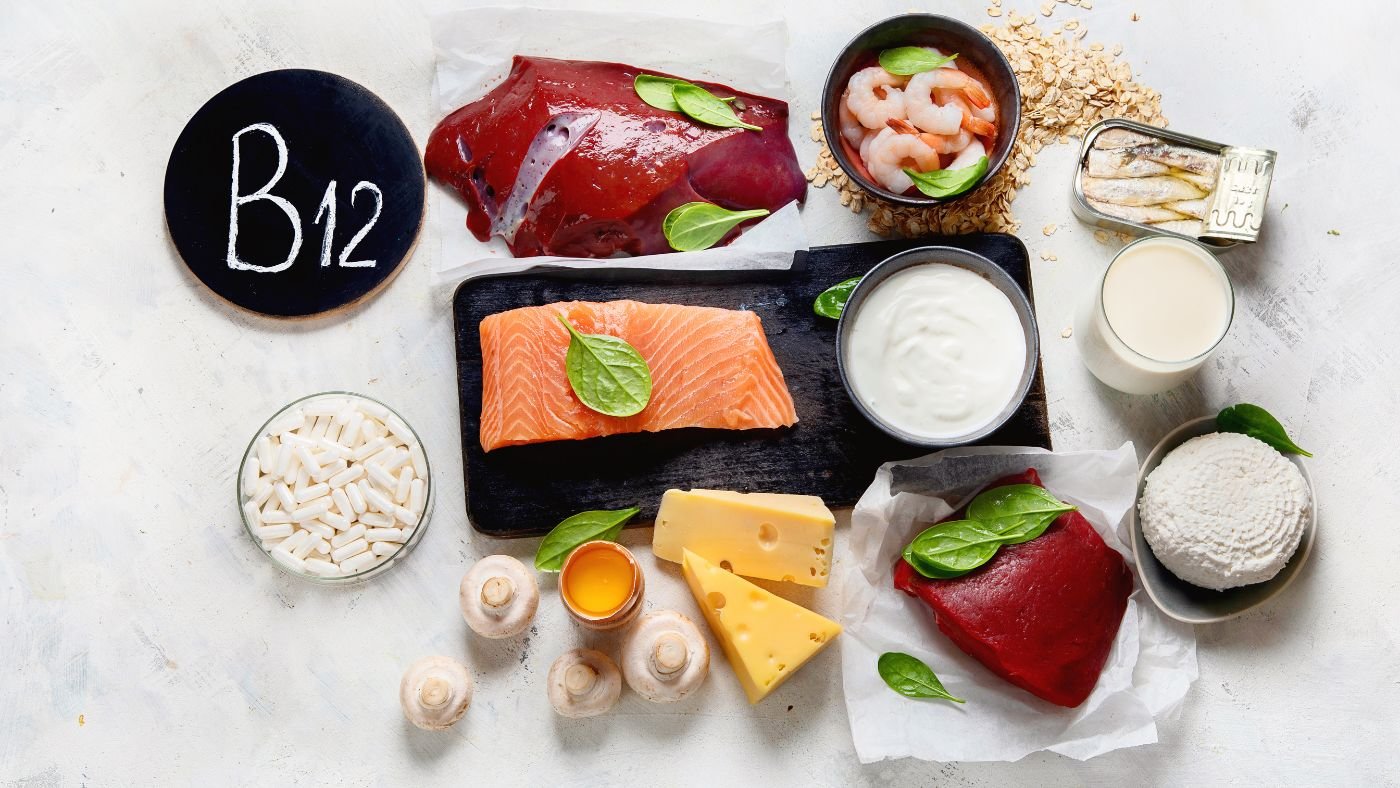Vitamin B12 (cobalamin) is a vital nutrient required for various body functions such as red blood cell production, DNA synthesis and proper functioning of the nervous system. Also known as cobalamin, this water-soluble vitamin is involved in metabolism.1
He is one of the eight Group B vitamins and is necessary for DNA synthesis, fatty acid and amino acid metabolism, normal functioning of the nervous system and maturation of red blood cells in the bone marrow. In addition, vitamin B12 helps reduce homocysteine levels, lowers cholesterol levels, helps supply cells with oxygen, participates in cell regeneration and contributes to the formation of active vitamin forms.
Good food sources of vitamin B12 include poultry, meat, fish and dairy products. Vitamin B 12 is also added to some foods. Vitamin B12 deficiency can be treated with higher-than-daily vitamin B12 injections or targeted supplements.
Our bodies do not produce vitamin B12 (a water-soluble vitamin), we must obtain it from animal-based foods or supplements. Although B12 reserves are stored in the liver for up to 5 years, in the long run the accumulated resources may not be enough if it is not ensured by daily nutrition or quality supplements.
In this article, we will delve into the reasons why vitamin B12 is so important to our health, discuss the symptoms and consequences of its deficiency, and offer solutions to ensure sufficient levels of this vitamin in our bodies. We will also look at natural sources of vitamin B12, recommended dosages and its importance during pregnancy.

Interesting facts about vitamin b12
Humans absorb vitamin B12 in two ways: by passive diffusion through the intestinal wall and through receptors in the stomach. The most common cause of vitamin B12 deficiency is pernicious anemia, an autoimmune condition that affects the stomach's ability to absorb vitamin B12.
Vitamin B12 is essential for nerve function, DNA production and anemia prevention. It plays an important role in nerve and brain health, is important for central nervous system function, and helps improve cognitive function.
It is interesting that:
- Vitamin B12 is the only vitamin that contains a cobalt atom.
- Vitamin B12 reserves in the human body are sufficient for 3-5 years.
- Vegetarians and vegans have a higher risk of developing vitamin B12 deficiency, as this vitamin is mainly found in foods of animal origin.
How much vitamin B12 do you need per day?
The answer depends on your age, dietary habits and medical conditions, and what medications you are taking.
The recommended daily intake of vitamin B12 for adults is 2.4 micrograms (mcg). However, this rate varies by age:
| Age | Quantity per day |
| For babies up to 6 months of age: | 0.4 mcg |
| For babies aged 7-12 months: | 0.5 mcg |
| For children aged 1-3 years: | 0.9 mcg |
| For children aged 4-8 years: | 1.2 mcg |
| For children aged 9-13: | 1.8 mcg |
| For teenagers aged 14-18: | 2.4 mcg |
| For adults | 2.4 mcg |
The overall recommended daily allowance for vitamin B12 is about 2.8 µg, with a maximum limit of 5 µg per day. Most people can meet this need by eating a balanced diet. There is no upper limit for vitamin B12 intake, as it is water soluble and excess is excreted in the urine.
It is important to note that recommended doses of vitamin B12 may vary depending on individual needs and health status. It is always recommended to consult a healthcare professional regarding the most appropriate dosage.
Vitamin B12 deficiency
Most people in Europe get enough of this nutrient. If you are not sure, you can take a questionnaire "Your Day" and it will show you what nutrients you may need.
As we age, it can become more difficult to absorb this vitamin. It can also happen if you've had weight loss surgery or other surgery that removes part of your stomach. A very high risk factor for vitamin b12 deficiency is alcohol consumption.
You may also be more likely to be deficient in vitamin B12 if you have:
- Atrophic gastritis, in which the lining of your stomach has thinned
- Pernicious anemia, which makes it difficult for your body to absorb vitamin B12
- Conditions, which affect your small intestine, such as Crohn's disease, celiac disease, bacterial overgrowth, or parasites.
- Alcohol abuse or you've been drinking a lot, which can make it harder for your body to absorb nutrients or prevent you from eating enough calories. One of the signs that you don't have enough B12 can be glossitis, or a swollen, red tongue.
- Immune system disorders, such as Graves' disease or lupus
- Taking certain medications that interfere with the absorption of B12. These include some heartburn medications, including proton pump inhibitors (PPIs) such as esomeprazole (Nexium), lansoprazole (Prevacid), omeprazole (Prilosec OTC), pantoprazole (Protonix), and rabeprazole (Aciphex), H2 receptor blockers such as ., famotidine (Pepcid AC), and certain diabetes medicines such as metformin (Glucophage).
You can also be deficient in vitamin B12 if you follow a vegan diet (meaning you don't eat any animal products, including meat, milk, cheese, and eggs) or if you're a vegetarian who doesn't eat enough eggs or dairy. In both of these cases, you can only use quality supplements in your diet to meet your body's needs.
Causes and symptoms of vitamin B12 deficiency
Vitamin B12 deficiency during pregnancy may be associated with lower birth weight and higher cholesterol in the child's blood. Pregnant women who are deficient in this vitamin may have low levels of leptin (a hormone that regulates appetite and metabolism).
Vitamin B12 deficiency can cause anemia in both mother and baby, which can lead to low birth weight and impaired physical and mental development. In addition, a lack of this vitamin during pregnancy can increase the risk of premature birth and low birth weight. Deficiency in pregnant women can also affect fetal development, leading to developmental disabilities and neurological problems in babies.
Vegetarians can be deficient in B12 because it is found mostly in meat, dairy products and eggs. Vegans have a more limited choice of natural sources and may need to consider taking supplements.
Causes of vitamin B12 deficiency may include insufficient dietary intake, impaired absorption due to conditions such as pernicious anemia, bacterial overgrowth, or celiac disease, as well as certain medications such as proton pump inhibitors and metformin.
Deficiency symptoms may include:
- fatigue
- weakness
- dizziness
- heart palpitations
- shortness of breath
- pale skin
- mouth ulcers
- smooth tongue
- numbness or tingling in the hands and feet
- memory and cognitive difficulties.
Diagnosing a vitamin B12 deficiency can be difficult because symptoms are similar to other conditions, but specific signs such as a swollen tongue, yellowing of the skin, and cognitive difficulties can indicate a deficiency.
Early symptoms of vitamin B12 deficiency include fatigue and weakness, and anemia can also be a result of this vitamin deficiency.
A deficiency can also cause a variety of additional symptoms, such as fatigue, neurological problems, depression, hair loss, pale skin, numbness or tingling in the hands and feet, memory problems, and dizziness.
Vitamin B12 during pregnancy are you a young mother
Adequate levels of vitamin B12 are especially important during pregnancy, as its deficiency can have serious consequences for both the mother and the baby. Children whose mothers were deficient in this vitamin during pregnancy have a higher risk of developing type 2 diabetes or other metabolic disorders. They are also at greater risk of insulin resistance, which increases the likelihood of type 2 diabetes.
The recommended daily intake of vitamin B12 for pregnant women is 2.6 micrograms, and for lactating women - 2.8 micrograms.
In order to ensure a sufficient amount of vitamin B12 during pregnancy, it is recommended:
- Eat foods rich in vitamin B12, such as meat, fish, eggs and dairy products
- Vegetarians and vegans should consider taking vitamin B12 supplements
- Regularly check the level of vitamin B12 in the blood
- Consult a healthcare professional for individual needs and recommendations
Food sources and best supplements
Vitamin B12 is found mainly in animal products such as meat, fish, eggs and dairy products. Beef, liver and chicken are some of the best sources of vitamin B12. Fish such as trout, salmon, tuna and cod are also rich sources of vitamin B12. Dairy products such as milk, cheese and yogurt are good sources of vitamin B12.
Vegetarians and vegans may have difficulty getting enough vitamin B12 from their diet and may need to take supplements. Vegan-friendly sources of vitamin B12 include:
- Fortified plant-based milk (soy, almond, oat, etc.)
- Nutritional yeast
- Fortified breakfast cereal
Other natural sources of vitamin B12 include:
- Black caviar
- Shrimp
- Red caviar
- Egg yolks
- Lamb
- Salmon
- Speckled trout
- Eggs
- Chicken livers
Vitamin B12 supplements are generally safe and well tolerated. They come in two forms: cyanocobalamin (synthetic) and methylcobalamin (natural). Supplement prices range from a few euros to more than ten euros per pack. It is always recommended to consult a healthcare professional before taking any supplements, as vitamin B12 overdose is rare but can occur.
Treatment of vitamin B12 deficiency
A doctor can diagnose vitamin B12 deficiency through a blood test, and treatment usually involves supplementing with vitamin B12 through oral supplements or injections. Treatment options include:
- Intramuscular injections of cyanocobalamin
- Hydroxocobalamin injections
- Oral vitamin B12
If you are anemic or have difficulty absorbing vitamin B12, you will need to supplement with this vitamin initially. You may need to continue taking high doses of this supplement.
If you don't eat animal products, you can supplement your diet by including:
- Nutritional yeast
- Chlorella
- Seaweed
Older adults who are deficient in vitamin B12 will likely need to take daily B12 supplements or multivitamins that contain B12.
For most people, a daily supplement of this vitamin solves the problem. However, any nerve damage caused by a deficiency can be permanent.

Frequently asked questions about vitamin B12
What is vitamin B12 and why is it important?
Vitamin B12, also known as cobalamin, is an important water-soluble vitamin needed for red blood cell formation, nervous system function, and DNA synthesis. It helps prevent megaloblastic anemia, which causes fatigue and weakness.
What foods are good sources of vitamin B12?
The best sources of vitamin B12 are animal products such as meat, fish, poultry, eggs and dairy products. Vegetarians and vegans may have a harder time getting enough B12 and should consider taking supplements or foods fortified with vitamin B12.
How do I know if I am deficient in vitamin B12?
Vitamin B12 deficiency can only be diagnosed by a doctor who has performed a blood test. Common symptoms include fatigue, weakness, confusion, depression, memory problems, and difficulty walking.
Are Vitamin B12 Supplements Safe?
Yes, vitamin B12 supplements are generally considered safe because the body only absorbs what it needs and the excess is excreted in the urine. However, it is advised to consult a healthcare professional before taking any supplements.
Conclusions
In summary, vitamin B12 is vital to our health because it is involved in many important body functions, such as red blood cell production, nervous system function, and DNA synthesis. Unfortunately, not all people get enough of this vitamin from their diet, especially vegetarians, vegans and the elderly. Long-term vitamin B12 deficiency can lead to serious health problems such as anemia, nerve damage, and cognitive impairment.
To avoid vitamin B12 deficiency, it is important to eat a balanced diet that includes animal products or fortified plant foods. Those who struggle to get enough vitamin B12 from food may benefit from taking a supplement, but it is always recommended to consult a healthcare professional before taking it. Regular testing of vitamin B12 blood levels can also help in early diagnosis and treatment of a possible deficiency.












